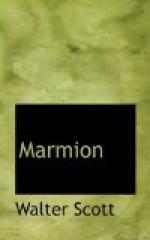The Captain mark’d his alter’d look,
And gave a squire the sign;
230
A mighty wassell-bowl he took,
And crown’d it high with wine.
’Now pledge me here, Lord Marmion:
But first I pray thee fair,
Where hast thou left that page of thine,
235
That used to serve thy cup of wine,
Whose beauty was so rare?
When last in Raby towers we met,
The boy I closely eyed,
And often mark’d his cheeks were wet,
240
With tears he fain would hide:
His was no rugged horse-boy’s hand,
To burnish shield or sharpen brand,
Or saddle battle-steed;
But meeter seem’d for lady fair,
245
To fan her cheek, or curl her hair,
Or through embroidery, rich and rare,
The slender silk to lead:
His skin was fair, his ringlets gold,
His bosom—when he sigh’d,
250
The russet doublet’s rugged fold
Could scarce repel its pride!
Say, hast thou given that lovely youth
To serve in lady’s bower?
Or was the gentle page, in sooth,
255
A gentle paramour?’
XVI.
Lord Marmion ill could brook such jest;
He roll’d his kindling eye,
With pain his rising wrath suppress’d,
Yet made a calm reply:
260
’That boy thou thought’st so goodly fair,
He might not brook the northern air.
More of his fate if thou wouldst learn,
I left him sick in Lindisfarn:
Enough of him.—But, Heron, say,
265
Why does thy lovely lady gay
Disdain to grace the hall to-day?
Or has that dame, so fair and sage,
Gone on some pious pilgrimage?’—
He spoke in covert scorn, for fame
270
Whisper’d light tales of Heron’s dame.
XVII.
Unmark’d, at least unreck’d, the taunt,
Careless the Knight replied,
’No bird, whose feathers gaily flaunt,
Delights in cage to bide:
275
Norham is grim and grated close,
Hemm’d in by battlement and fosse,
And many a darksome tower;
And better loves my lady bright
To sit in liberty and light,
280
In fair Queen Margaret’s bower.
We hold our greyhound in our hand,
Our falcon on our glove;
But where shall we find leash or band,
For dame that loves to rove?
285
Let the wild falcon soar her swing,
She’ll stoop when she has tired her wing.’—




